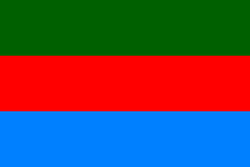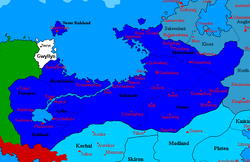Slobovia
 | |
| Official language | Slobovish, English |
|---|---|
| Capital | Grøßenburg |
| Largest cities | Grøßenburg, Slobenburg, Þohnrsburg |
| Website | SloboWikien |
| Forum | defunct |
| Number of citizens | 12 |
| Number of active citizens | 0 (Nation Inactive) |
| Date founded | April 1, 2000 |
| Government | Various |
| Current leader | Troy Thompson (Treigh Tomsonhnd) |
| Currency | Slobovish bynnestælær (B$) |
| National animal | unknown |
| National fruit/food | unknown |
| National drink | White Slobovian |
 | |
| Map versions | 6.4.0 - 6.7.6; 6.8.4 - 6.8.7; inexplicable inclusion in 13.8.5b |
Slobovia was a micronation originally founded in 2000. Over the years, Slobovia fluctuated largely in size and activity, but it endured for a surprisingly long amount of time largely because of civic-minded citizens and, failing that, the sheer determination of the nation's founder to never let it die.
Slobovia went through many systems of government, but had its best and worst times as a republic. It was a republic throughout the Great Arwakung, and the republicanism was likely part of why the Arwakung succeeded (the Arwakungist republic encouraged citizen participation in all fields). But the fact that Slobovia was a republic also contributed in great part to the destruction that was wrought in the Gobbler Attacks (William Jesmer gained administrative access to Slobovia's old ezboard through the account of one of the admins, who may not have been an admin if Slobovia had not have been a republic at the time).
The nation put extremely high value into cultural pursuits. It placed extremely great pride behind the Slobovish Language, Slobovia's own conlang. It placed extremely great pride behind any valuable addition to the national culture, such as the White Slobovian, Slobovia's unofficial national drink, for example. Slobovia was very distinctive, and can be difficult to define; it may have been overlooked at times, but it could never be mistaken for anything other than itself.
History
The Birth of Slobovia
Late in the year 1999, Tregh Tomsohnd stumbled upon micronational websites and the hobby of micronationalism. In the next Spring, he and a group of his friends founded the first incarnation of Slobovia, which was at the time an offline hobby micronation. Tomsohnd was declared Kaiser of Slobovia. In the beginning, Slobovia's theme was based partially upon late Nineteenth Century Germany, most Slobovians of the time having German ancestry.
On August 8, 2000, after lying about the age of the micronation, Slobovia was admitted into the League of Secessionist States. Thus began nine months of immaturity and bug nationhood, culminating in the Slobovia vs. Optimus Guardiat conflict of February 1 - May 3, 2001, which resulted in Slobovia being annexed by the People's Republic of Amador to end the troubles, and the Optimus Guardiat ending its existence.
On July 1, 2001, Slobovia re-obtained her independence from Amador, but from then into early 2002, slowly bled to death. As 2002 began, Slobovia lost its value in fun, and as a hobby micronation, thus was dormant.
Slobovia as an Online Micronation
In August, 2002, Tomsohnd immigrated to the Kingdom of Babkha, and shortly thereafter brought Slobovia, of which he was the only remaining citizen, under Babkhan sovereignty. Slobovia did not grow during the time that it was a Babkhan colony, however, Tomsohnd learned many political and diplomatic lessons in his time in Babkha. He ended up obtaining the prestigious position of Vizier of Culture and Public Welfare under the Government of then Grand Vizier Tahmaseb Farshbaf, as well as a seat in the Majlis, and an appointment as an envoy to Baracão.
Tomsohnd, however, was not satisfied for long with lower level positions, and, in December of the same year, quietly seceded from Babkha, with Babkhan acceptance. He then took Slobovia and entered it into an ill-fated federation of his own design, the Federated States of Prinitica. The Federated States, combined with its later successor state, the Kingdom of Ayllu, did not last through March, 2003. Finally, in April, 2003, Slobovia was resurrected as, for the first time, an independent online hobby micronation.
In her state of new found independence, Slobovia returned to her original German Imperial theme, and for the first time even included German language therein. This would not last, however, as Tomsohnd's desire to experiment with different systems of government got the best of him. A socialist republic was established, and during the same time, the King of Cranda, who was also a Slobov at the time, began developing the Slobovish Language.
Slobovia's Great Awakening
As the Slobovish Language was developing, a new political ideal came to lead the new Slobovish Republic that followed the socialist Slobovish Democratic Republic; this ideal was Arwakungism. Arwakung is the Slobovish word for "awakening, reawakening, renaissance," and the Arwakungist Movement came to be at the forefront of calling for a federal republic composed of the Germanic-themed micronations of Micras of the time (namely, Slobovia, Cranda and Northworthy).
As Arwakungism guided Slobovian policy, leaders in Cranda and Northworthy also began to wish for the creation of a union of the Germanic-themed micronations of the MCS. The result of this was Arminy, which originally was simply a community of micronations with shared defensive and diplomatic functions. As time went by, however, the Crandish and Northworthians wanted to form a total union, as a monarchy, while the Slobovs wanted a republic. In the end, this led to the Slobovish withdrawal from the Arminian Community and, thereafter, Cranda and Northworthy composed the United Kingdom of Arminy.
Gobbler
After withdrawing from the Arminian Community, Slobovia went back to being a republic for a short period of time. The Gobbler Attacks, however, ended the Slobovish Republic, as security concerns lead to the restoration of the Monarchy. This Slobovish Empire itself only lasted a few weeks, as Tomsohnd no longer had the time to devote to micronations.
The Little Interlude of þie Wehzieðe
In December, 2004, however, Edgard Portela would bring Tomsohnd back into micronations as a member of the Republic of San Martin. Originally, Tomsohnd was the Republic's Vice President, however, he defeated Portela in the Republic's first actual Presidential Election, and thus became head of state. During his time as President of San Martin, he brought Slobovia back as the Kingdom of Slobovia, and, later, was crowned Emperor of San Martin, after a coup lead by Portela, hence creating a personal union between Slobovia and San Martin.
Tomsohnd allowed his creative and visionary side take over, and began to maneuver for the creation of a political union that was to be known as Opulentia. After a great deal of planning, it was decided that after the Opulentian union was complete, Opulentia would be made a decentralized micronation of a new breed, half online and half offline, with the offline portions including many social and economic functions. Fate and rebellion, however, prevented this from happening, as Martino socialists began a rebellion that ended with Tomsohnd's abdication as Emperor of San Martin, and the eventual collapse of San Martin.
The Return of þie Wehzieðe
Following the collapse of the Martino Empire, and the death of any hopes for the creation of Opulentia, Tomsohnd made the decision to bring Slobovia back to its roots. He immediately folded the online Kingdom of Slobovia, and began planning for the new, offline, Slobovish Realm. For the first time ever, Slobovia was not just to be a hobby micronation, but it would be a parallel society, with political, social and economic purposes.
However, Tomsohnd didn't figure out how he was going to recruit people. In 2007 and 2008, Slobovia was back as a online micronation, but still haunted by the ghosts of Gobbler, the failure of Opulentia, and the difficulty of returning to the good times of the Arwakung. These ghosts combined to create a Slobovia that was unsure of itself, a Slobovia that was so petrified of another Gobbler that elements strongly wanted monarchy, but a Slobovia that remembered so well the bliss of the Arwakung that other elements could not stomach monarchy.
During the 2007-2008 period, Slobovia frequently fluctuated between monarchy, republic and inactivity. Finally, however, the worst fears of the monarchists were realized when Slobovia's invision board was attacked on 15 April 2008. This pushed Tomsohnd, who had been sitting on the fence, over the edge to the point where he sided with the monarchists. However, the damage was done and Slobovia again collapsed into inactivity.
Culture
Slobovia was always first and foremost a recreational micronation, which also had social, political and economic faces. A large part of the social and recreational faces center around simulating the trappings of a nation/state, but this simulation is less simulation in some important areas. In the culture and the general community, Slobovia is defined by its participants rather than by the simulation. The nation's motto was Þu Woltsch, Þu Kantsch (Roughly translating as If you will it, You can do it)
The one great simulated aspect that is absolutely important to Slobovish culture is the Slobovish Language. As a constructed language it is very much simulated, and as a ceremonial language it did not serve very much as a functional aspect. However, the Slobovish language was a defining factor in Slobovish culture, and a source of pride for many Slobovs.
Beyond the simulated aspects, there were some very real cultural elements, such as Slobovish cuisine, Slobovia's symbols, Slobovish poetry and lyrics, etc., which were real because they were real manifestations of the mix of cultural influences brought to the table by the individual members of the community. Moreover, the community itself was very real; Slobovia was the sum of all of its citizens.
National Anthem
Leuþ zo Slobowien (Slobovish for "Hymn to Slobovia") is a Slobovish patriotic song originally written by Tregh Tomsohnd and Johanns fonn Klosso in 2003. It was originally intended for use as a national anthem and was the best candidate for being the national anthem of Slobovia, despite the fact that it only consists of one verse. However, although it was the best anthem available, it was never officially adopted.
| Leuþ zo Slobowien | |
|---|---|
| Slobovish lyrics | Approximate translation |
|
Slobowien, hailas go’! |
Slobovia, hail to thee! |
